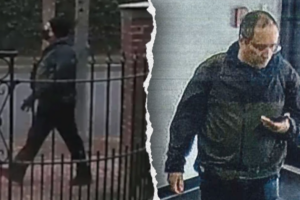
Open this photo in gallery:
Minister of Justice Sean Fraser announces details on a new anti-hate bill on Parliament Hill in Ottawa on Friday.Justin Tang/The Canadian Press
A new anti-hate bill would make it a crime, punishable by up to 10 years in prison, to obstruct someone from accessing a place of worship or other sites where Jews, Muslims and other identifiable groups gather, Justice Minister Sean Fraser announced on Friday.
The Combatting Hate bill would also criminalize the promotion of hatred against religious or ethnic groups, as well as the LGBTQ community, by publicly displaying terror or hate symbols, including the swastika and symbol of the Nazi SS.
Published on Friday, the bill follows calls from members of the Jewish community and others for measures offering greater protection against harassment, attacks and vilification, including outside synagogues and community centres.
Last year, the number of hate crimes reported to the police across the country increased, with 68 per cent targeting the Jewish community and 17 per cent targeting Muslims.
“This move by the federal government has been a long time coming and represents an important step toward making Canada’s Jewish communities safer,” said Jaime Kirzner-Roberts, senior director, policy and advocacy at the Friends of Simon Wiesenthal Center in an e-mail.
“For far too long, individuals who display hate symbols, glorify terrorism, or obstruct Jews from peacefully gathering in what should be safe spaces have been given a free pass.”
She continued: “Freedom of expression is a cornerstone of our democracy. But when actions cross the line into incitement, hate and threats against vulnerable groups, they are no longer legitimate protest – they are acts of intimidation and a threat to the fabric of Canadian society. This cannot be tolerated in a country that values equality and safety for all its citizens.”
The bill defines hate and creates a hate-crime offence in the Criminal Code, with punishments of up to life in prison, if an offence is linked to another crime, such as murder.
It would make it easier for the police to charge people for promoting genocide and other “hate propaganda” offences by removing the requirement to get prior approval of the attorney-general.
At a press conference in Ottawa, Mr. Fraser said the bill would not inhibit freedom of speech and has been designed to make sure it does not affect peaceful protests, including near religious and cultural centres.
He indicated that there would not be a blanket ban on displaying symbols of terror groups – for example, wearing a T-shirt with a swastika, Hezbollah, Proud Boys or Tamil Tiger insignia and walking down the street. He said that whether the person has committed a crime would “depend upon the person’s behaviour and the circumstances.”
He added that “law enforcement and prosecutors will need to be satisfied that they were using the symbols to willfully promote hate.”
The bill would make it a crime to engage in any conduct with the intent to make someone afraid in order to prevent them from accessing a religious or cultural institution and other specified places. This could include threats, acts of violence or other intimidating behaviour.
The offence would be punishable by a maximum penalty of 10 years imprisonment, or two years less a day for less-serious offences.
The proposed obstruction offence would make it a crime, punishable by up to 10 years in prison, to intentionally obstruct or interfere with another person’s access to such places. It could include deliberately blocking doors, driveways, or roads that are used to get to religious or cultural centres, or preventing someone from entering those places.
The proposed criminal offences are designed to protect buildings used for worship including synagogues, mosques, churches, temples and gurdwaras, as well as cemeteries. Community centres, seniors’ residences and schools used by an “identifiable group” would also be covered.
An “identifiable group” is a term used in the Criminal Code as a group distinguished by colour, race, religion, national or ethnic origin, age, sex, sexual orientation, gender identity or expression, or mental or physical disability.
Mr. Fraser said the measures in the federal bill are distinct from “bubble-zone” laws introduced by provinces and municipalities.
“We have seen recently synagogues in Halifax vandalized with hate symbols. We have seen violent attacks against people in Montreal because they are Jewish. We have seen the desecration of the National Holocaust Memorial. We have seen Muslim Canadians suffer discrimination for many years,” Mr. Fraser said. “Sadly there is no community that is immune from hate.”
Promotion of hate by displaying the symbols of terror groups would encompass organizations on a list of entities banned by the federal government. They include Islamic State, Hamas, Hezbollah, the Tamil Tigers, Proud Boys, neo-Nazi network Blood and Honour, the Popular Front for the Liberation of Palestine and the Taliban.
But some civil-liberties campaigners raised fears on Friday that other groups could be added to the list in future, extending the ban to suppress freedom of expression.
Josh Dehaas, counsel at the Canadian Constitution Foundation, said: “As civil libertarians, we get nervous when governments start criminalizing symbols.”
“Symbols are protected speech and it’s dangerous to let governments threaten us with jail time for our speech, no matter how offensive it may be.
“That’s not to say a flag or symbol couldn’t form part of the context for hate speech or intimidation charges, but it already can so it’s unclear why we’d need another law.”
Conservative deputy leader Melissa Lantsman said her party would study the bill but blamed the Liberals for “inaction” over the past two years as communities called out for help to tackle violence and intimidation.
“No one should be afraid to worship in peace,” she said in an e-mail.
Noah Shack, CEO for the Centre for Israel and Jewish Affairs, said the bill “is an important signal of government action to confront serious threats facing Canada’s Jewish community.”
“No Canadian should be targeted when dropping their kids off at school, visiting an elderly parent, or attending religious services.
“This legislation reflects core Canadian values: the right to live safely, free from hate, violence and extremism.”
More to come





